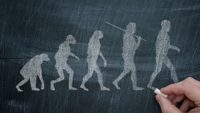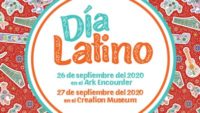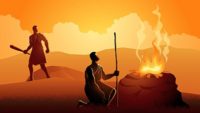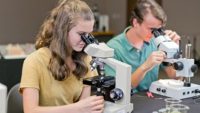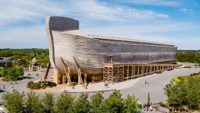The United Nation’s Intergovernmental Panel on Climate Change (IPCC) has recently claimed that agriculture is a major producer of greenhouse gases and should be considered a climate “villain.” However, the calculations that formed the basis of these claims completely neglected the fact that crop plants scrub the atmosphere of carbon dioxide on a massive scale, and thus help lower greenhouse gasses. This flawed global warming res… More… …read more Source: icr.org
The Salt Range of Pakistan has yielded some very interesting fossils-that according to evolution should not have been found! …read more Source: creation.com
The field of modern optics owes much to the creationist who invented the kaleidoscope two centuries ago. …read more Source: creation.com
By Dr. Terry Mortenson Nobody should minimize the danger of errors, especially when we teach error to others. …read more Source: AIG Daily
By Dr. Nathaniel T. Jeanson Repeated misrepresentations of creationist views protect the legal basis for excluding creationism from the classroom. …read more Source: AIG Daily
By Ken Ham According to a new Gallup poll, more Americans (43%) said buying or wearing fur clothing is morally wrong than said sex outside of marriage (27%), divorce (18%), or homosexual acts (32%) were unacceptable. Well, you could sum up this poll with one verse of Scripture, “they exchanged the truth about God for a lie and worshiped and served the creature rather than the Creator” (Romans 1:25). The answers given to the questions in this national survey really reflect how arbitrary the standard for morality is in our nation. The answers given to the questions in this national [More]
How do I include a creation perspective? …read more Source: creation.com
By Dr. David Menton How the fossil record, evolutionary assumptions, artistic license, and anatomical differences do NOT confirm common ancestry between humans and apes. …read more Source: AIG Daily
By Ken Ham We’re excited to announce the dates for our 2020 Día Latino event—September 26 at the Ark Encounter and September 27 at the Creation Museum. This event is very popular and is a wonderful outreach to the Latino community here in the United States and for those who visit from Central and South America. Día Latino is a wonderful opportunity to equip our brothers and sisters in Christ and reach out to unbelievers. If you’re a Spanish-speaker, join us for this exciting two-day event. Spanish signage and captions will be available, along with Spanish interpreters, so Spanish-speakers can [More]
The astonishing numbers of abortions performed each year is indicative of the complete loss of society’s Judeo-Christian foundations, which should drive Christians to their knees in prayer. …read more Source: creation.com
By Sarah Chaffee On the episode of ID the Future we bring you a production by Discovery Institute about C.S. Lewis and Intelligent Design. With contributions by Discovery Institute’s John West and philosophers Victor Reppert and Angus Menuge, we hear about Lewis’s early doubts about God based in part on an argument from undesign or “bad design” in nature, and how he moved from this position to developing multiple arguments for intelligent design. Another contribution he made to the intelligent design project wasn’t a specific argument but the example he set. As John West explains near the end of the [More]
Photosynthesis in plants starts with the absorption of light energy from sunlight, but scientists have been baffled as to how plants utilize the noisy solar spectrum to power the photosynthetic process. By applying engineering principles used to construct wireless antennae reception and energy transfer in human-designed systems, scientists uncovered an ingenious system of design for light harvesting in plants.1 Photosynt… More… …read more Source: icr.org
By Tim Chaffey Does the Old Testament Law in Numbers 5 allow for abortion in certain circumstances, or was it a protective measure for women in ancient Israel? …read more Source: AIG Daily
By Troy Lacey Adam and Eve’s children Cain and Abel are featured throughout the Bible: the anger and murder of Cain, the mark of Cain, and the faithful example of Abel. …read more Source: AIG Daily
Is flight an easy trait to lose? …read more Source: creation.com
Data obtained from the Cassini space probe show that Saturn’s largest moon, Titan, is receding away from Saturn a hundred times faster than scientists previously thought.1,2 Titan is moving away from Saturn for basically the same reason that the moon is receding away from the Earth. The moon’s gravitational influence causes ocean tides on both sides of the Earth—the side nearest the moon and the side fa… More… …read more Source: icr.org
By Ken Ham The best way to foster a love of science in young people is to let them do it themselves! Science labs are a great way of doing hands-on science that inspires a lifetime of learning. But they can be tricky to do at home, especially in the high school years. That’s why we’re offering high school labs at the Creation Museum. This fall we’re offering three full-year high school labs—in biology (which is already full), chemistry, and forensics. Each lab is 12 sessions with 24 labs total and they begin in September and go through April. Chemistry [More]
By Ken Ham As protests and some riots continue to rock major US cities, the national conversation has been dominated by questions regarding so-called “race,” racism, discrimination, prejudice, reforms, and historical monuments. How should Christians think about these important issues? Because the solutions offered by so many in our culture are anti-biblical, we want believers to be equipped to respond in a way that honors the Lord and his Word. Well, we’ve shared a lot the last few weeks about a biblical (and scientific) response to racism. I’ve been speaking on the topic since the 1970s and have made it [More]
Could advanced technology enable inter-stellar travel of extraterrestrials? …read more Source: creation.com
A new species of a split-footed lacewing was recently unearthed in British Columbia, Canada, creating a bit of controversy among secular paleontologists.1 All living relatives of this insect reside exclusively in Australia today.1 So, why are fossils of this insect found in Canada? Bruce Archibald of Simon Fraser University and Vladimar Makarkin of the Russian Academy of Sciences in Vladivostok tried to explai… More… …read more Source: icr.org
Have you heard the news? ICR’s Board of Trustees recently appointed Dr. Randy Guliuzza to be ICR’s new President & Chief Operating Officer. During the 12 years he served as ICR’s National Representative, he frequently shared his personal testimony while speaking at events. In this video, Dr. Guliuzza recounts how he providentially met the Lord through the bold, courageous witness of his high school friend June. Press play to… More… …read more Source: icr.org
Two of the remotest places ever visited by humans are the moon and the deepest part of the ocean. Earth’s lowest point is called the “Challenger Deep,” a depression inside the southern end of the Mariana Trench—the deepest point in the western Pacific Ocean, located in the territorial waters of the Federated States of Micronesia, east of the Mariana Islands. Kelly Walsh, th… More… …read more Source: icr.org
By Rich Wendling God placed within small seeds an astonishing ability to move mountains, which even pyramid builders sought to imitate. …read more Source: AIG Daily
By Sarah Chaffee On this episode of ID the Future, host Andrew McDiarmid draws on an essay at Evolution News & Science Today to explore some intricate optimized insect designs that are inspiring human engineers and raise the question, could evolution have done that? Cicadas and dragonflies use an exquisitely engineered “bed of nails” on their wings to disarm and neutralize bacteria. Butterflies and bird feathers also use this trick. There are fruit flies that have multiple navigation systems, complete with error correction for hard turns. And the sea skater insect is able to walk on water and launch itself [More]
By Dr. Nathaniel T. Jeanson We previously reported an egregious case of professional scientific misconduct; one of the perpetrators has responded with additional dishonesty. …read more Source: AIG Daily
By Ken Ham After being in lockdown for weeks or months, many American families are ready to get out and enjoy a family vacation! As COVID-related travel bans are being lifted and as states reopen, we’re seeing lots of families coming to visit the Ark Encounter and Creation Museum in Northern Kentucky. It’s exciting to know that thousands of children are being taught about the truth of God’s Word and the gospel. We’re so thrilled about kids coming and learning God’s Word that we give children ten and under free admission to both attractions for 2020 in order to encourage [More]
By Sarah Chaffee On this episode of ID the Future, Andrew McDiarmid continues his conversation with Robert Waltzer, chair of the department of biology at Belhaven University and co-author of Evolution and Intelligent Design in a Nutshell, on three big problems faced by naturalistic evolutionary theory. First, it appears that science has turned up several instances of what is known as irreducible complexity, something that Darwin himself said would falsify his theory if ever discovered. Second, various proposed “trees of life” conflict with each other, a problem that has grown worse as additional evidence and methods have arisen, a trend [More]

























